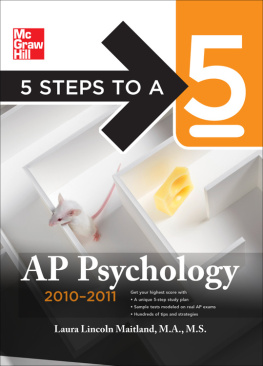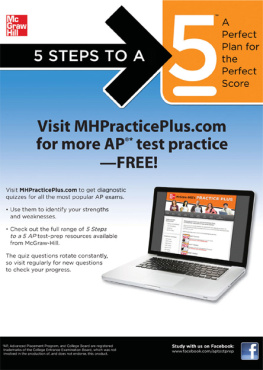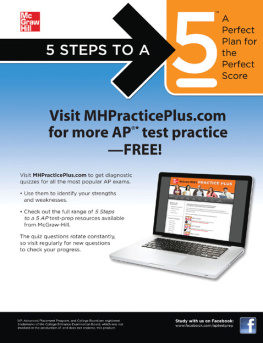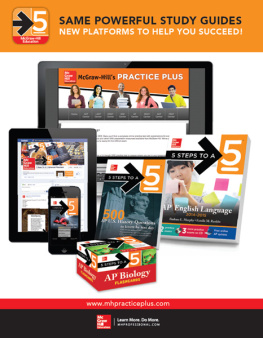Appendixes
ABOUT THE AUTHOR
Laura Lincoln Maitland received a BA in Biological Sciences from Douglass College, an MA in Psychology from Stony Brook University, an MS in Education from CUNY-Queens College and a Professional Diploma from Long Island University.
Retired from the Bellmore-Merrick Central H.S. District where she was lead science chairperson and taught Living Environment, AP Psychology, and Science Research for many years, she is currently an adjunct instructor at Hofstra University. She is also an education consultant at Cold Spring Harbor Laboratories, Long Island BOCES, and a variety of other venues. Laura has been a workshop presenter for the College Board, the New York State Biology-Chemistry Professional Development Network, Cold Spring Harbor Laboratorys Dolan DNA Learning Center, the Bellmore-Merrick Central High School District, the New York City Board of Education, and the New York State Education Department.
One of the founders and early chairs of Teachers of Psychology in Secondary Schools, she chaired the committee that created National Standards for High School Psychology Curricula. She also served on the AP Psychology Development Committee for the College Board/ETS. She received the first American Psychological Association Presidential Citation presented to a high school teacher and the American Psychological Association Division Two Excellence in Teaching Award.
BIBLIOGRAPHY
Because college textbooks are constantly being updated, copyright dates for these books are omitted. These are all books that are currently being used in AP Psychology classes by teachers whose students succeed on the exam. In general, books published since 2005 are good resources for you to use along with this test preparation book whenever youd like to read more about a topic in the course.
Baron, Robert A. Psychology. Needham Heights, MA: Allyn & Bacon.
Bernstein, Douglas A., Alison Clarke-Stewart, Edward J. Roy, and Louis A. Penner. Psychology. Boston: Houghton Mifflin.
Davis, Stephen. F., and Joseph J. Palladino. Psychology. Upper Saddle River, NJ: Prentice Hall.
Feldman, Robert S. Understanding Psychology. New York: McGraw-Hill.
Gazzaniga, Michael S., and Todd F. Heatherton. Psychological Science: Mind, Brain, and Behavior. New York: W. W. Norton.
Gerrig, Richard, and Philip Zimbardo. Psychology and Life. Needham Heights, MA: Allyn & Bacon.
Gerow, Josh, and Kenneth S. Bordens. Psychology: An Introduction. Richardson, TX: Harrison Press.
Gleitman, Henry, Alan J. Fridlund, and Daniel Reisberg. Psychology. New York: W. W. Norton.
Gray, Peter. Psychology. New York: Worth.
Halonen, Jane S., and John W. Santrock. Psychology: Contexts & Applications. Boston: McGraw-Hill College.
Hockenbury, Don H., and Sandra E. Hockenbury. Psychology. New York: Worth.
Kalat, James W. Introduction to Psychology. Belmont, CA: Wadsworth.
Kassin, Saul. Psychology. Upper Saddle River, NJ: Prentice Hall.
Kosslyn, Stephen M., and Robin S. Rosenberg. Psychology: The Brain, the Person, the World. Needham Heights, MA: Allyn & Bacon.
Kowalski, Robin M., and Drew Westen. Psychology. Hoboken, NJ: John Wiley & Sons.
Lahey, Benjamin B. Psychology: An Introduction. New York: McGraw-Hill.
Lefton, Lester A., and Linda Brannon. Psychology. Boston: Allyn & Bacon.
Morris, Charles G., and Albert A. Maisto. Psychology: An Introduction. Upper Saddle River, NJ: Prentice Hall.
Myers, David G. Psychology. New York: Worth.
Passer, Michael W., and Ronald E. Smith. Psychology: Frontiers and Applications. New York, NY: McGraw-Hill.
Plotnik, Rod. Introduction to Psychology. Belmont, CA: Wadsworth.
Santrock, John W. Psychology. New York: McGraw-Hill.
Sdorow, Lester M., and Cheryl A. Rickabaugh. Psychology. New York: McGraw-Hill.
Smith, Edward E., Susan Nolen-Hoeksema, Barbara Fredrickson, and Geoffrey Loftus. Atkinson & Hilgards Introduction to Psychology. Belmont, CA: Wadsworth.
Sternberg, Robert J. In Search of the Human Mind. Belmont, CA: Harcourt College.
Wade, Carole, and Carol Tavris. Psychology. Upper Saddle River, NJ: Prentice Hall.
Weiten, Wayne. Psychology: Themes and Variations. Belmont, CA: Wadsworth.
Westen, Drew. Psychology: Mind, Brain, and Culture. New York: John Wiley & Sons.
Zimbardo, Philip G., Anne L. Weber, and Robert L. Johnson. Psychology: Core Concepts. Boston: Allyn & Bacon.
CHAPTER 1
What You Need to Know About the AP Psychology Exam
IN THIS CHAPTER
Summary: Learn what topics are tested, how the test is scored, and basic test-taking information.

Key ideas
 AP Psychology is equivalent to a college-level introductory psychology course.
AP Psychology is equivalent to a college-level introductory psychology course.
 Most, but not all, colleges will award credit for a score of 4 or 5.
Most, but not all, colleges will award credit for a score of 4 or 5.
 Multiple-choice questions account for two-thirds of your final score.
Multiple-choice questions account for two-thirds of your final score.
 One-quarter of a point is deducted for each wrong answer on multiple-choice questions.
One-quarter of a point is deducted for each wrong answer on multiple-choice questions.
 Free-response questions account for one-third of your final score.
Free-response questions account for one-third of your final score.
 Your composite score on the two test sections is converted to a score on the 1-to-5 scale.
Your composite score on the two test sections is converted to a score on the 1-to-5 scale.
Background Information
The College Boards Advanced Placement (AP) program enables high school students to study college-level subjects. Most colleges grant credit, placement, or both for qualifying AP exam grades. You may want to check with the colleges of your choice to find out their policies. Enrollment in AP Psychology has increased annually since its inception to become one of the most popular of 37 AP courses and exams offered.
Some Frequently Asked Questions about the AP Psychology Exam
Why Take the AP Psychology Exam?

AP Psychology is an exciting course to take not only because it gives you an opportunity to understand your own behavior and mental processes better, but also because it enables you to learn more about other people and animals. Benefits of taking such a challenging course can include strengthening your transcript, proving to yourself that you can do it, and starting college with some credit. Admissions officers from Adelphi University to Yale University have told me that their number one criterion for admissions decisions is the strength of an applicants high school program.
Im glad I took AP Psychology in high school. It eased my transition to college. I knew the level of work I needed to do to succeed and what studying for a college final is like before enrolling. |
Kim, college student |
Additional benefits are sometimes offered. Some high schools weight or scale AP course grades. Because some colleges charge per credit, you can save money. Getting three or more credits for the price of the exam is a good value.







 AP Psychology is equivalent to a college-level introductory psychology course.
AP Psychology is equivalent to a college-level introductory psychology course.